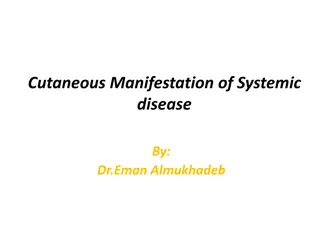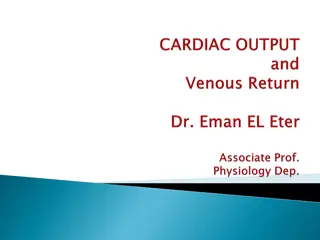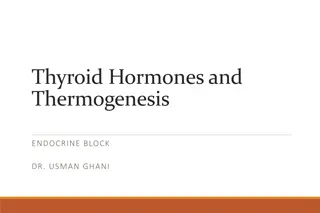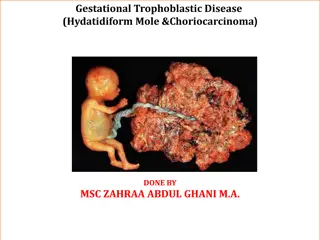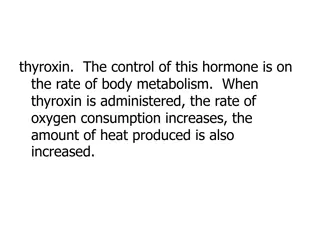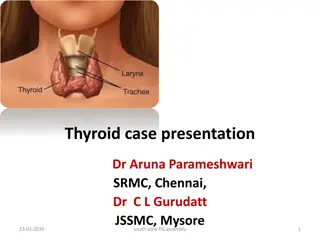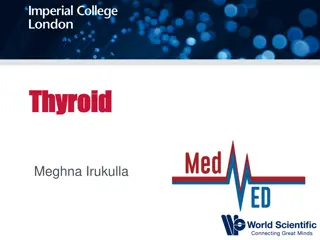Cutaneous Manifestations of Systemic Diseases: Endocrine Disorders and Diabetes Mellitus
Explore the cutaneous manifestations of systemic diseases, particularly focusing on endocrine disorders like diabetes mellitus. Learn about the dermatologic signs associated with conditions such as hypothyroidism, hyperthyroidism, Addison's disease, and Cushing syndrome. Discover specific manifestat
0 views • 88 slides
Understanding Cardiac Output and Venous Return in Cardiovascular Physiology
Cardiac output, stroke volume, end-diastolic and end-systolic volumes play vital roles in cardiovascular function. Factors affecting cardiac output include physiological conditions and pathological states like hyperthyroidism and myocardial infarction. Venous return, controlled by mechanisms like Fr
0 views • 27 slides
Understanding Thyroid Hormones: Biosynthesis, Functions, and Clinical Implications
This educational material delves into the types and biosynthesis of thyroid hormones, the physiological actions of thyroid hormones, regulation levels, thyroid function tests, goiter, and the distinction between hypo- and hyperthyroidism. It covers the role of thyroid hormones in thermogenesis, meta
0 views • 33 slides
Understanding Gestational Trophoblastic Disease: Hydatidiform Mole & Choriocarcinoma
Gestational trophoblastic disease encompasses hydatidiform mole, invasive mole, and choriocarcinoma. This condition involves abnormal fertilization of the oocyte, resulting in various presentations including abnormal growth of the uterus, severe nausea, vaginal bleeding, and symptoms resembling hype
1 views • 9 slides
Overview of Shock Classifications and Causes
Shock is classified into different types such as Hypovolemic, Cardiogenic, Obstructive, Distributive, and Endocrine shock. Hypovolemic shock results from fluid loss, while Cardiogenic shock is due to heart failure. Obstructive shock occurs from mechanical obstructions, whereas Distributive shock is
1 views • 11 slides
Importance of Iodine Nutrition During Pregnancy
Iodine is essential for thyroid hormone synthesis, crucial for neurological development in utero and early life. Adequate iodine levels prevent adverse effects like decreased IQ, goiter, hypothyroidism, and hyperthyroidism. Mild to moderate iodine deficiency in pregnant women can have adverse outcom
0 views • 21 slides
Thyroxin and Functions of Thyroid Gland
Thyroxin hormone plays a crucial role in regulating body metabolism. Administration of thyroxin boosts oxygen consumption and heat production. The thyroid gland's functions include managing production of thyroxin, leading to hyperthyroidism or hypothyroidism. Disorders such as cretinism and myxedema
0 views • 102 slides
Management of Hyperthyroidism in Pregnancy: Diagnosis and Treatment Options
Diagnosis and treatment of hyperthyroidism in pregnancy involves consideration of clinical manifestations, establishing the cause (such as Graves Disease or hCG mediated hyperthyroidism), and determining the need for treatment based on the severity of symptoms. Therapeutic options include medication
0 views • 8 slides
Thyroid Case Presentation and Examination Methods Overview
This presentation discusses a case of a 48-year-old woman with a multinodular goiter scheduled for total thyroidectomy, highlighting symptoms, drug therapy implications, and examination methods like Lahey's and Crile's methods. The importance of history-taking, differentiation of primary and seconda
0 views • 45 slides
Thyroid Disorders Overview & Learning Objectives
Explore the comprehensive overview of thyroid disorders, including hyperthyroidism, hypothyroidism, thyroid cancer, and more. Delve into learning objectives such as Grave's Disease, Thyroiditis, and Multiple Endocrine Neoplasia. This educational content covers essential information for understanding
0 views • 53 slides
